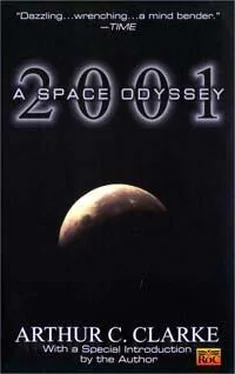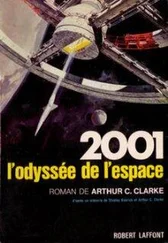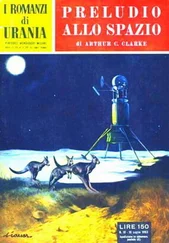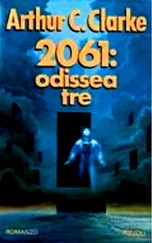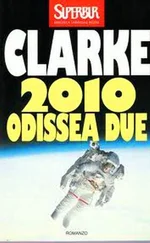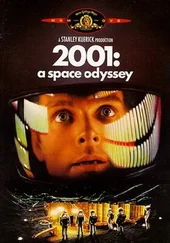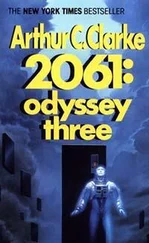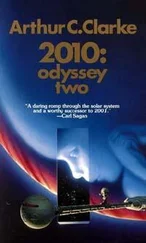For a few seconds, he studied the small metal hatch with its four wire-secured locking nuts. Then, muttering to himself, "Tampering by unauthorized personnel invalidates the manufacturer's guarantee," he snipped the wires and started to untwist the nuts. They were a standard size, fitting the zero-torque wrench that he carried. The tool's internal spring mechanism would absorb the reaction as the nuts were unthreaded, so that the operator would have no tendency to spin around in reverse.
The four nuts came off without any trouble, and Poole stowed them carefully away in a convenient pouch. (One day, somebody had predicted, Earth would have a ring like Saturn's, composed entirely of lost bolts, fasteners, and even tools that had escaped from careless orbital construction workers.) The metal cover was a little sticky, and for a moment he was afraid it might have cold-welded into place; but after a few taps it came loose, and he secured it to the antenna mounting by a large crocodile clip.
Now he could see the electronic circuitry of the AE-35 unit. It was in the form of a thin slab, about the size of a postcard, gripped by a slot just large enough to hold it. The unit was secured in place by two locking bars, and had a small handle so that it could be easily removed.
But it was still operating, feeding the antenna the impulses that kept it aimed at the far-off pinpoint of Earth. If it was pulled out now, all control would be lost, and the dish would slam round to its neutral or zero-azimuth position, pointing along the axis of Discovery. And this could be dangerous; it might crash into him as it rotated.
To avoid this particular hazard, it was only necessary to cut off power to the control system; then the antenna could not move, unless Poole knocked against it himself. There was no danger of losing Earth during the few minutes it would take him to replace the unit; their target would not have shifted appreciably against the background of the stars in such a brief interval of time.
"Hal," Poole called over the radio circuit, "I am about to remove the unit. Switch off all control power to the antenna system."
"Antenna control power off," answered Hal.
"Here goes. I'm pulling the unit out now."
The card slipped out of its slot with no difficulty; it did not jam, and none of the dozens of sliding contacts stuck. Within a minute, the spare was in place.
But Poole was taking no chances. He pushed himself gently away from the antenna mount, just in case the big dish went wild when power was restored. When he was safely out of range, he called to Hal: "The new unit should be operational. Restore control power."
"Power on," answered Hal. The antenna remained rock steady.
"Carry out fault prediction tests."
Now microscopic pulses would be bouncing through the complex circuitry of the unit, probing for possible failures, testing the myriads of components to see that they all lay within their specified tolerances. This had been done, of course, a score of times before the unit had ever left the factory; but that was two years ago, and more than half a billion miles away. It was often impossible to see how solid-state electronic components could fail; yet they did.
"Circuit fully operational," reported Hal after only ten seconds. In that time, he carried out as many tests as a small army of human inspectors.
"Fine," said Poole with satisfaction. "Now replacing the cover."
This was often the most dangerous part of an extravehicular operation: when a job was finished and it was merely a matter of tidying up and getting back inside the ship – that was when the mistakes were made. But Frank Poole would not have been on this mission if he had not been careful and conscientious. He took his time, and though one of the locking nuts almost got away from him, he caught it before it had traveled more than a few feet.
Fifteen minutes later he was jetting back into the space-pod garage, quietly confident that here was one job that need not be done again.
In this, however, he was sadly mistaken.
"Do you mean to say," exclaimed Frank Poole, more surprised than annoyed, "that I did all that work for nothing?"
"Seems like it," answered Bowman. "The unit checks out perfectly. Even under two hundred percent overload, there's no fault prediction indicated."
The two men were standing in the tiny workshop-cum-lab in the carrousel, which was more convenient than the space-pod garage for minor repairs and exanimations. There was no danger, here, of meeting blobs of hot solder drifting down the breeze, or of completely losing small items of equipment that had decided to go into orbit. Such things could – and did – happen in the zero-gee environment of the pod bay.
The thin, card-sized plate of the AE-35 unit lay on the bench under a powerful magnifying lens. It was plugged into a standard connection frame, from which a neat bundle of multicolored wire led to an automatic test set, no bigger than an ordinary desk computer. To check any unit it was only necessary to connect it up, slip in the appropriate card from the "trouble-shooting" library, and press a button. Usually the exact location of the fault would be indicated on a small display screen, with recommendations for action.
"Try it yourself," said Bowman, in a somewhat frustrated voice. Poole turned the OVERLOAD SELECT switch to X-2 and jabbed the TEST button. At once, the screen flashed the notice: UNIT OK.
"I suppose we could go on turning up the juice until we burned the thing out," he said, "but that would prove nothing. What do you make of it?"
"Hal's internal fault predictor could have made a mistake."
"It's more likely that our test rig has slipped up. Anyway, better safe than sorry. It's just as well that we replaced the unit, if there's the slightest doubt."
Bowman unclipped the wafer of circuitry, and held it up to the light. The partly translucent material was veined with an intricate network of wiring and spotted with dimly visible microcomponents, so that it looked like some piece of abstract art.
"We can't take any chances – after all, this is our link with Earth. I'll file it as N/G and drop it in the junk store. Someone else can worry about it, when we get home."
But the worrying was to start long before that, with the next transmission from Earth.
"X-ray-Delta-One, this is Mission Control, reference our two-one-five-five. We appear to have a slight problem.
"Your report that there is nothing wrong with the Alpha Echo three five unit agrees with our diagnosis. The fault could lie in the associated antenna circuits, but if so that should be apparent from other tests.
"There is a third possibility, which may be more serious. Your computer may have made an error in predicting the fault. Both our own nine-triple-zeros agree in suggesting this, on the basis of their information. This is not necessarily cause for alarm, in view of the back-up systems we have, but we would like you to watch out for any further deviations from nominal performance. We have suspected several minor irregularities in the past few days, but none have been important enough for remedial action, and they have shown no obvious pattern from which we can draw any conclusions. We are running further tests with both our computers and will report as soon as the results are available. We repeat that there is no need for alarm; the worst that can happen is that we may have to disconnect your nine-triple-zero temporarily for program analysis, and hand over control to one of our computers. The time lag will introduce problems, but our feasibility studies indicate that Earth control is perfectly satisfactory at this stage of the mission.
"X-ray-Delta-One, this is Mission Control, two-one-five-six, transmission concluded."
Читать дальше
